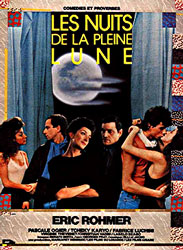|
|
|
|
|
 |
 |
|
| |
Les Nuits de la pleine lune
Série Comédies et Proverbes, IV
(Vollmondnächte | Full Moon in Paris)
|
|
|
| |
 |
France 1984 - 102 Minuten -
Regie: Eric Rohmer
Produzent: Margaret Menegoz
Produktion: Les Films Ariane / Les Films du Losange
Drehbuch: Eric Rohmer
Kamera: Renato Berta (Eastmancolor, 1.37:1, 35mm)
Schnitt: Cécile Decugis
Musik: Jacno, Elli Medeiros (als Elli et Jacno)
Ton: Georges Prat (Mono)
Dekor: Pascale Ogier
Kostüme: Pascale Ogier
Drehort: Paris
Darsteller: Pascale Ogier (Louise), Tchéky Karyo (Rémi), Fabrice Luchini (Octave), Virginie Thévenet (Camille), Christian Vadim (Bastien), László Szabó (le peintre), Lisa Garneri (Tina), Anne-Severine Liotard (Marianne)
Premiere: 29 August 1984 (France) • 26 April 1985 (BRD)
Auszeichnungen: César 1985 nominé Meilleur réalisateur: Eric Rohmer • Venezia Film Festival 1984 Volpi Cup Best Actress: Pascale Ogier
|

|
|
 International Movie Database International Movie Database |
 All-Movie Guide All-Movie Guide |
|
|
| |
 |
|
| |
A young woman looks for the true meaning of love and learns the truth of the old saw "you don't know what you've got until it's gone," in this fourth installment in Eric Rohmer's "Comedies and Proverbs" series. The story opens with the proverb "He who has two women loses his soul. He who has two houses loses his mind," and centers on lovely Louise and her live-in lover Remy, a Paris architect and noted tennis player. They live on the outskirts of Paris in a suburb. Their relationship hits an important juncture because he wants to get married while she wants to continue being a lively party girl. Eventually, she decides that she must escape her lover's oppression and become intimate with loneliness so she moves to Paris where she makes complex plans to have her cake and eat it too. Unfortunately, things don't go exactly as planned and she finds herself the object of an amiable writer's affections. Though she keeps it innocent, Louise and Remy begin to drift further apart and she suspects that he has met someone else.
The fourth entry in Rohmer's "Comedies and Proverbs" series (The Aviator's Wife [1980]; Le Beau Marriage [1982]; and Pauline at the Beach [1983]), Full Moon in Paris offers the same enlightening conversations on youth and romance as the others. Ogier stars as the quintessential Rohmer woman, loved and admired by the men around her but desperately confused about the meaning of love. ... Although the plot is simple, Full Moon in Paris is anything but a superficial meandering on differing philosophies of love. What Rohmer has done in this film, and has done so successfully in the past, is to take a brief, intelligent, comic look at a young Frenchwoman's ideas about love—not particularly revelatory but presented in a fresh way. The choice of superb, unknown actresses in the lead roles contributes substantially—Ogier (the 24-year-old daughter of renowned actress Bulle) exudes an animated energy that is rarely captured on the screen. Her performance earned her a Best Actress award at the Venice Film Festival (a prize awarded Beatrice Romand two years earlier for her role in Le Beau Marriage), although her career was tragically cut short by a fatal heart attack. Like the other films in this series, Full Moon in Paris begins with a French proverb: "He who has two women loses his soul. He who has two houses loses his mind."
Les Nuits de la pleine lune (1984) is a film of winter, marked by the image of the Parisian suburbs, where the heroine Louise (Pascale Ogier) cannot bear to live all the time. In this, the fourth of the series of ’Comedies and Proverbs’, Rohmer offers one of his most successful portraits of a talker in the person of the verbal seducer Octave (Fabrice Luchini), who is more narcissistic than sensual and notes down those of his own phrases which appeal to him. But if Octave is quintessentially an inhabitant of Rohmer’s customary world — someone for whom the lives of those around him are part of a construct, a novel waiting to be written — the central actions of Les Nuits de la pleine lune break this delicate balance. Louise’s permanent boyfriend Remi is too clumsy, brutal and ill-at-ease with words to fit easily into Rohmer’s world: his simple passion and appetite destroy its delicate contours. And Louise herself, seeking space in too close a relationship with Remi, finds that the risk so lightly accepted (if she falls in love with someone else she will tell Remi and leave him) is turned against her. Shattered when Remi announces his new love, Louise has nowhere to go. As she is crushed in this way, Rohmer’s lack of tenderness for his characters is very apparent. Frail and butterflylike, even a little silly, Louise needs an indulgence that Rohmer’s camera never allows her. Despite its flaws, however, Les Nuits de la pleine lune reaffirms Rohmer’s unequalled skill as a director of dialogue scenes. Rohmer has never been an experimental film maker in the manner of Godard or Robbe-Grillet, and his particular classicism, rooted in a love of eighteenth-century literature, is clearly more in tune with the inward-looking unadventurous climate of current French film production procedures.
Roy Armes: French Cinema. New York 1985, p. 280
|
| |
 |
| |
|
|
|
| |
 |
DVD
|
|
| Länge: |
|
| Video: |
|
| Bitrate: |
|
| Audio: |
|
| Untertitel: |
|
| Features: |
|
| DVD-VÖ: |
|
|
|
|
 |
|
|
|
|
|
| |
![[filmGremium Home]](../../image/logokl.jpg) |
|
|
![[filmGremium Home]](../../image/logokl.jpg)